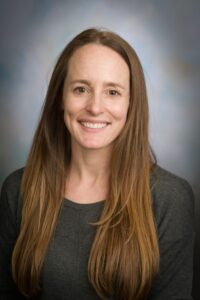
Megan Moran, a Ph.D. student in the Applied Development Science program in the Colorado State University Department of Human Development and Family Studies, received a 2023-24 Dean’s Fellowship to study how mindfulness-based intervention (MBI) can help prevent mental health issues in youth. Moran is also a 2023-24 VPR Graduate Fellow, awarded by the CSU Vice President for Research office. Read on to learn more about Moran’s experience working in youth development and her current research.
Tell us about where you are from and your undergraduate experience.
I’m from Maryland, outside Washington, D.C., and attended Georgetown University for undergrad. I spent about 10 years working in education, youth development, and research between undergrad and coming to CSU for grad school.
What inspired you to continue to graduate school at CSU and to apply for the Dean’s Fellowship?
I spent several years working in youth development partnering with public schools in rural communities to deliver life skills programming, and this led to my interest in better understanding evidence-based programs to improve youth outcomes. Often, it felt like the programs and interventions that had an evidence base weren’t developed for communities like the ones I was working in, and I realized I wanted to develop the skills to identify how and why certain programs work and for whom. So, I got a job working in a research lab at the University of Virginia, where we were evaluating interventions focused on improving student motivation and academic achievement. There I developed foundational research skills and solidified my desire to pursue Ph.D. training so I could conduct my own research. These experiences, coupled with my experience as a mindfulness teacher led me to narrow my focus on MBI and its effects on mental health in adolescents.
Describe your research and its significance.
At the broadest level, my research is focused on preventing adverse mental health outcomes during the developmentally sensitive period of adolescence and promoting adolescent thriving. There is a critical need for this line of research given that mental health problems among U.S. adolescents have increased over the past decade and are the leading cause of disability among this age group. MBI, which is often delivered as a multi-session group program, has been associated with positive outcomes in adolescents, including improvements in emotion regulation and indicators of physical health/wellness, as well as reductions in depression/anxiety symptoms and subjective distress.
However, there is still a lot that we don’t understand about the processes occurring during and between intervention sessions. In light of this gap, I’ve chosen to focus my research on investigating novel, theoretically informed mechanisms underlying MBI and its effects on adolescent health outcomes. Specifically, my dissertation is examining the role of engagement (i.e., the degree of productive involvement in an activity) in MBI efficacy.
What do you hope will be the long-term impacts of your research?
Through my dissertation project, I hope to develop a model of adolescent MBI engagement and deepen our understanding of how engagement is related to key outcomes of MBI. This research could potentially inform the development and delivery of MBI and help us better leverage engagement to support adolescents in benefitting from MBI. I think this direction of research could help enhance the potential of MBI for preventing mental health challenges for a vulnerable age group.
How have your mentors helped to guide you throughout your career so far?
I am so fortunate to work with two amazing mentors, Dr. Rachel Lucas-Thompson and Dr. Lauren Shomaker. From the beginning of my time at CSU, they have supported my research interests and helped me find ways to pursue these interests within the studies that they both have going on in their labs. They provided critical guidance as I developed my dissertation idea and wrote my fellowship application, providing many rounds of feedback and making themselves available for numerous conversations to fine-tune my research strategy. Rachel and Lauren have taken the time to deeply understand my interests and goals, and they proactively highlight and support me in pursuing opportunities that will help me move toward those goals. They exemplify what it means to be an excellent mentor, both professionally and personally, and I am incredibly grateful to be working with and learning from them.
What are your future plans after earning your Ph.D.?
My career goal is to lead community-engaged research that deepens our understanding of the mechanisms of MBI and strengthens the science of its implementation. After I get my Ph.D., I could see myself doing that work as a faculty member at a research-focused university, but I think there are lots of possibilities in terms of types of roles and institutions where I might pursue this goal.
The Department of Human Development and Family Studies is part of CSU’s College of Health and Human Sciences.